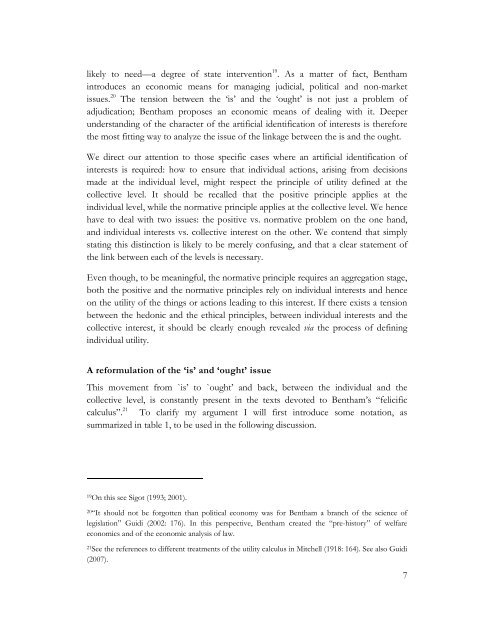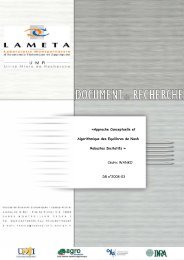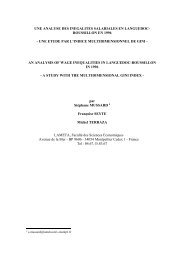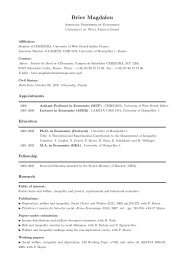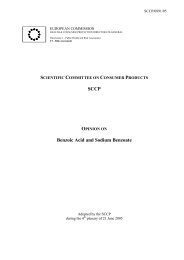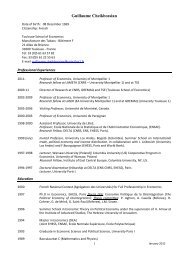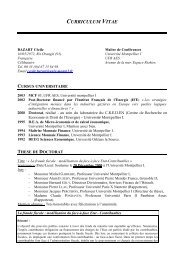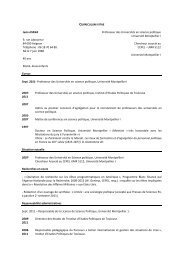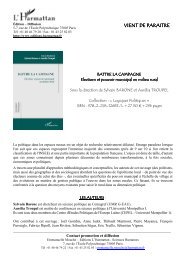either of external intervention—the Civil or Penal code, the legal-administrativesupervision of the town or city, or suitable legislation (Bentham, 1830; 1827; 1872);or internal intervention, resorting to a deontologist (Bentham, 1831).There are two ways of tackling the problem of identification of interests in Bentham‘swork. The first consists in considering the diversity of the modalities of identification.Some authors have noted an opposition between his economic and political stances,defending a natural identification in the former case and an artificial identification ofinterest in the latter. 17 But it is difficult to uphold this schizophrenic relationshipbetween the economic and the legislative domain. Other writers have recently shownthat Bentham also supports state intervention in the economic domain. 18 Anexception to this demarcation moderates this view.The second approach to consideration of the gap between individual and collectiveinterests is to focus on the case of artificial identification of interests. I thereforefocus upon those states in which artificial identification is the only reliable modalityof a junction of interests. The same conclusion can be obtained: according to theprinciple of utility, any domain, political or economic, is likely to need—or is not―Tous les hommes veulent être heureux ; mais ne peut-il pas, ne doit-il pas arriver que les moyensemployés par les divers individus pour être heureux soient contradictoires entre eux ? [...] Puisquecelui-ci cède à l‘attrait du plaisir, il faut le menacer de l‘infliction d‘une douleur au moins égale enintensité au plaisir auquel il aspire. Par ces menaces, des actes sont érigés en délits. La science del‘intimidation, voilà la législation ; l‘utilité générale est la raison d‘être, et la peine est la sanction desobligations qu‘elle impose. [...] Le législateur est, dans la société, le grand dispensateur des plaisirs etdes peines. C‘est lui qui crée l‘ordre moral, l‘équilibre des intérêts. La société est l‘œuvre de sesartifices. – Ainsi trouve son application ce que nous avons appelé le principe de l‘identificationartificielle des intérêts.‖ Halévy (1905, III: 216-217)17 ―However, the two principles upon which rest both the legal and the economic philosophy of theBenthamites are contradictory. This contradiction entirely shatters the familiar precepts ofBenthamism. Do we then have to resolve this contradiction by saying that each of the two principleshas its application in distinct domains that the principle of the artificial identification of interests is thetrue principle of the science of law, and the principle of natural identity of interests the true principleof economic science? It is obvious that Bentham has borrowed from two contradictory sources increating his system.‖ Trans. ―Or, les deux principes sur lesquels reposent respectivement la philosophiejuridique et la philosophie économique des Benthamites sont deux principes contradictoires : lacontradiction éclate à chaque instant dans les formules courantes du Benthamisme. [...] Faudra-t-ildonc se borner à résoudre la contradiction en disant que les deux principes trouvent chacun sonapplication dans un domaine distinct, que le principe de l‘identification artificielle des intérêts est levéritable principe de la science du droit et le principe de l‘identité naturelle des intérêts le véritableprincipe de la science économique ? Il est évident que Bentham a emprunté à deux sourcescontradictoires d‘un même système.‖ Halévy (1905, III: 219)18 See Sigot (1993) among others.6
likely to need—a degree of state intervention 19 . As a matter of fact, Benthamintroduces an economic means for managing judicial, political and non-marketissues. 20 The tension between the ‗is‘ and the ‗ought‘ is not just a problem ofadjudication; Bentham proposes an economic means of dealing with it. Deeperunderstanding of the character of the artificial identification of interests is thereforethe most fitting way to analyze the issue of the linkage between the is and the ought.We direct our attention to those specific cases where an artificial identification ofinterests is required: how to ensure that individual actions, arising from decisionsmade at the individual level, might respect the principle of utility defined at thecollective level. It should be recalled that the positive principle applies at theindividual level, while the normative principle applies at the collective level. We hencehave to deal with two issues: the positive vs. normative problem on the one hand,and individual interests vs. collective interest on the other. We contend that simplystating this distinction is likely to be merely confusing, and that a clear statement ofthe link between each of the levels is necessary.Even though, to be meaningful, the normative principle requires an aggregation stage,both the positive and the normative principles rely on individual interests and henceon the utility of the things or actions leading to this interest. If there exists a tensionbetween the hedonic and the ethical principles, between individual interests and thecollective interest, it should be clearly enough revealed via the process of definingindividual utility.A reformulation of the ‘is’ and ‘ought’ issueThis movement from `is‘ to `ought‘ and back, between the individual and thecollective level, is constantly present in the texts devoted to Bentham‘s ―felicificcalculus‖. 21 To clarify my argument I will first introduce some notation, assummarized in table 1, to be used in the following discussion.19 On this see Sigot (1993; 2001).20 ―It should not be forgotten than political economy was for Bentham a branch of the science oflegislation‖ Guidi (2002: 176). In this perspective, Bentham created the ―pre-history‖ of welfareeconomics and of the economic analysis of law.21 See the references to different treatments of the utility calculus in Mitchell (1918: 164). See also Guidi(2007).7


